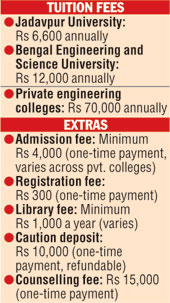 |
A private engineering college degree in Bengal just got costlier by Rs 29,000 a year with a teachers’ strike for higher pay forcing the government to approve a 70 per cent fee hike instead of the originally planned “moderate” raise.
The decision, to be formally announced in a day or two, will take the annual fees in the 80-odd private engineering colleges across Bengal from Rs 41,000 to Rs 70,000 from the academic session beginning next month. Old batches won’t be affected by the change in fee structure, sources said.
“We have taken this decision following repeated requests from the private engineering colleges. A fee revision was overdue… The fee structure is being revised after a gap of nearly seven years,” said a senior government official.
The government had initially agreed to a Rs 14,000 increase in fees from this academic year, but the indefinite strike by teachers of private engineering colleges affiliated to the West Bengal University of Technology (WBUT) prompted a review and a higher hike.
The teachers went on strike from Monday afternoon to pressure the colleges into implementing pay scales in line with the Sixth Pay Commission’s recommendations. The agitating teachers also decided to boycott evaluation of answer scripts of the semester exams conducted by the WBUT last month, putting the future of nearly 1.25 lakh students in jeopardy.
With the strike threatening the timely announcement of results — already delayed by the municipal polls — the authorities apparently stepped in to broker a deal between the college authorities and the teachers.
“We made it clear to the WBUT officials that a hike in salary was not possible unless the fees was raised to Rs 84,000 a year. As the government has promised another upward revision shortly, we have settled for Rs 70,000 a year for the time being,” said Dhurjoti Banerjee, the director of Mallabhum Institute of Technology and the general secretary of the association of private engineering institutions.
Besides the tuition fees, the students need to pay a one-time admission fee, annual library fees, refundable caution deposits, registration fees and counselling fees. For students staying in hostels, lodging fees and mess charges will be extra.
According to a rough estimate, a new engineering student will have to pay a minimum of Rs 1 lakh (excluding hostel and mess charges) during admission once the new fee structure takes effect.
“We understand that students coming from poor families will face a lot of difficulties. But we cannot ignore the demand of the colleges. The revised pay scales recommended by the Sixth Pay Commission are high and it is not possible for the institutions to bear the additional expenses if the students do not pay higher fees,” said an official of the higher education department.
But unlike the private institutes, the fee structure at Jadavpur University (Rs 6,600 annually) and the Bengal Engineering and Science University (Rs 12,000 annually) remain unchanged.
“I don’t know how my father will pay my fees… He is already stretched,” said the student seeking admission to a private engineering college in Salt Lake.
An official of a private college said that institutes would arrange for loans by tying up with banks, which the students could repay after getting jobs from campus placements.
But are good campus placements guaranteed? “The scope of a proper campus placement is restricted to a handful of colleges…There are several private engineering colleges that have failed to place their students. I don’t rule out a backlash from the student community,” said a teacher at Jadavpur University.
A colleague said the government had not shown similar enthusiasm in maintaining academic standards in private engineering colleges.










